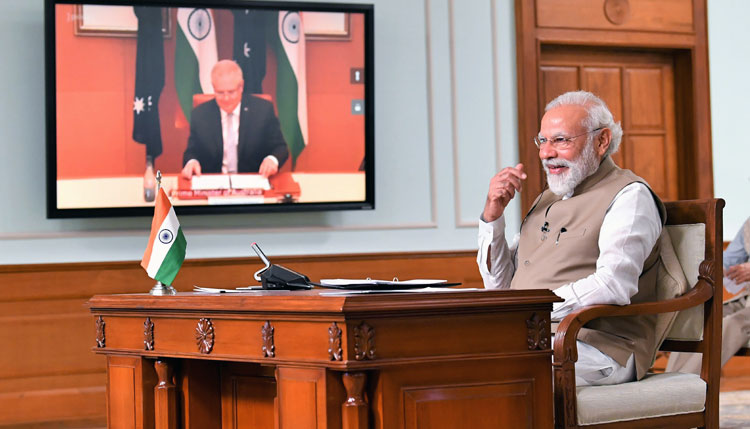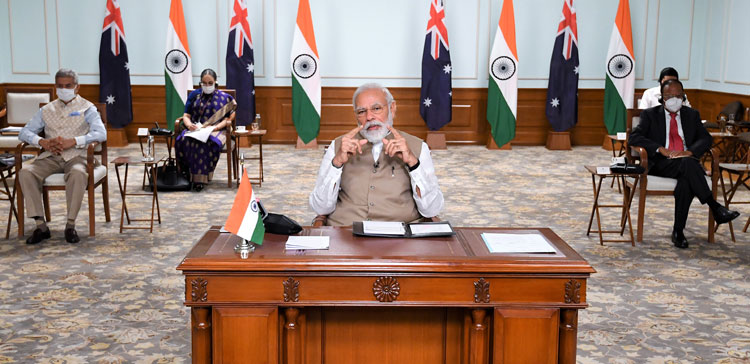INDIAN ARMED FORCES CHIEFS ON OUR RELENTLESS AND FOCUSED PUBLISHING EFFORTS

The insightful articles, inspiring narrations and analytical perspectives presented by the Editorial Team, establish an alluring connect with the reader. My compliments and best wishes to SP Guide Publications.

"Over the past 60 years, the growth of SP Guide Publications has mirrored the rising stature of Indian Navy. Its well-researched and informative magazines on Defence and Aerospace sector have served to shape an educated opinion of our military personnel, policy makers and the public alike. I wish SP's Publication team continued success, fair winds and following seas in all future endeavour!"

Since, its inception in 1964, SP Guide Publications has consistently demonstrated commitment to high-quality journalism in the aerospace and defence sectors, earning a well-deserved reputation as Asia's largest media house in this domain. I wish SP Guide Publications continued success in its pursuit of excellence.
India-Australia Pacts Boost Bonding
 |
The Author is Former Director General of Information Systems and A Special Forces Veteran, Indian Army |

In a virtual bilateral summit between Prime Minister Narendra Modi and Australian Prime Minister Scott Morrison on June 4, India and Australia upgraded their bilateral ties to ‘Comprehensive Strategic Partnership’ and signed multiple agreements to work for closer cooperation in the Indo-Pacific region. This summit held amid multiple Chinese intrusions in Indian Territory and China imposing economic sanctions against Australia, gains increased significance. It is sure to give stomach ache to Beijing though India-Australia bonding is not aimed at any country. But Chinese state media can be expected to spew vitriolic – the Chinese Communist Party having become a global pariah. Announcement by India and Australia that both nations will work together for ensuring “rules-based maritime order” in the Indo-Pacific region would prick the guilty conscience of China that has been blatantly disregarding the international norms and laws of the seas and aggressive posturing on territorial claims in the South China Sea.
The Modi-Morrison summit led to inking the landmark agreement for reciprocal access to military bases for logistics support in addition to inking six more pacts in defence, science and technology to broaden cooperation between the two nations. The Mutual Logistics Support Agreement (MLSA) will allow militaries of the two countries to use each other's bases for berthing, refueling, storage, repair and replenishment of supplies and refueling of warships on high seas by each other’s tankers besides facilitating scaling up of overall defence cooperation. Earlier, India has signed similar agreements with US, France and Singapore. India and the US have also pursued the Defence Technology and Trade Initiative (DTTI) since 2012 for cooperation in military technology joint development and production. India, US and Japan have been holding the trilateral naval exercise ‘Malabar’ annually. Australia had earlier pulled out from the first iteration of ‘Quad’ for fear of annoying China though India and Australia do participate in the joint naval exercises. However, having signed the MLSA, India inviting Australia to participate in future Malabar exercises appears certain. The other pacts agreed during the Modi-Morrison summit are to provide increased bilateral cooperation in the areas of: cyber and cyber-enabled critical technology; defence; military technology; mining and minerals; vocational education, and; water resources management.

Both sides deliberated on a host of key issues including dealing with growing threat of terrorism, maritime security challenges in the Indo-Pacific region, reform in the World Trade Organisation and ways to deal with the COVID-19 crisis. Modi said he believed that it is the "perfect time and perfect opportunity" to further strengthen the relationship between India and Australia. He said India was committed to expand its relations with Australia on a wider and faster pace, noting that it is important not only for the two countries, but also for the Indo-Pacific region and the world, adding, "The role of our comprehensive strategic partnership will be more important in this period of global epidemic. The world needs a coordinated and collaborative approach to get out of the economic and social side effects of this epidemic.” Morrison complemented PM Modi for his "constructive and very positive" role including at the G-20 role in pushing for a concerted global approach in dealing with the COVID-19 crisis. Modi and Morrison agreed to announce a ‘Shared Vision for Maritime Cooperation in the Indo-Pacific Region’ to “harness opportunities and meet challenges together” as ‘Comprehensive Strategic Partners’. Highlights of the Joint Declaration included: reiterating commitment to promoting peace, security, stability, prosperity - free, open, inclusive and rules based Indo-Pacific region based on respect for sovereignty and international law, particularly the United Nations Convention on the Law of the Sea (UNCLOS); cooperation in dealing with activities in maritime domain inconsistent with international law, particularly UNCLOS, including terrorism, piracy, drugs and arms smuggling, irregular migration, human trafficking, poaching of marine species, narcotics trafficking and illegal, unreported and unregulated fishing; cooperation in dealing with marine pollution, climate change, ocean acidification, shortage of potable water, loss of habitat due to storm surges and saline water intrusion, are also of shared concern; regular ministerial-level dialogues in foreign affairs, defence and trade policy, and senior officials meetings like ‘defence policy talks’, ‘Australia-India maritime dialogue’ and ‘navy to navy staff talks’; cooperation in regional and multilateral arrangements including ASEAN, ASEAN Regional Forum (ARF), ASEAN Defence Ministers Meeting Plus, East Asia Summit (EAS), Indian Ocean Rim Association, Indian Ocean Naval Symposium, Indian Ocean Tuna Commission, International Maritime Organization and Indo-Pacific Oceans Initiative (IPOI) announced by PM Modi at the 14th East Asia Summit on November 4, 2019 at Bangkok to improve management of oceans; deepen navy-to-navy cooperation and strengthen maritime domain awareness in the Indo-Pacific region through enhanced exchange of information, as also work to enhance civil maritime cooperation between law enforcement agencies and coast guard cooperation; ensure sustainable use of living and non-living marine resources in the Indo-Pacific region in accordance with international law to protect marine environment and reduce impact of marine pollution, particularly plastics, and climate change, and: jointly work towards implementation of an Action Plan with specific measures to advance bilateral maritime cooperation in line with this Vision.”
For long, China had been meddling in Australian politics and domestic affairs till Australia decided to break free. Notably, Australia has been most vocal in demanding independent inquiry into the release of Coronavirus from Wuhan in China. There is no denying that the virus attack by China and its belligerently aggressive actions have brought India and Australia together whose mutual relations till now were lukewarm. Signing of MLSA is a big step forward aimed at increasing military interoperability through advanced defence exercises. In a way MLSA also moves the ‘Quad’ towards strategic bonding which is very essential in face of China gone rogue and Beijing’s desire to dominate in the Indo-Pacific, steamrolling territories and freedom of action of other nations. In fact, the time has come for forming the ‘Quad Plus’ grouping of like minded nations. The proposal by US President Donald Trump of an expanded G-7 to include India and Australia is a welcome step. India’s geographical location jutting into the Indian Ocean and strategic importance of Australia’s Indian Ocean territories make them natural partners. Enhanced cooperation between the two has the potential of mutual benefits and contributing greatly towards a rule-based international order.





